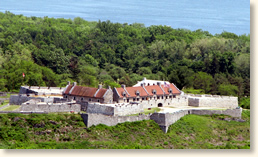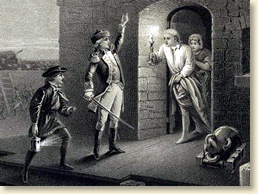|
Ethan Allen Captures
Fort Ticonderoga, 1775
The British military outpost of Fort Ticonderoga occupied a commanding strategic location in upstate New York that overlooked a portion of the potential invasion route the British would take from Canada down Lake Champlain to the Hudson Valley and ultimately to New York City. If successful, this British line of conquest would separate the New England colonies from their southern brethren. Having accomplished this division, the British could concentrate on first defeating one isolated segment of the rebellious colonies and then the other.
Fully aware of Fort Ticonderoga's strategic importance, the leaders of the colony of Connecticut, whose territory included the future state of Vermont, called upon Ethan Allen, leader of a militia unit know as the Green Mountain Boys, to capture the fortress following the Battles of Lexington and Concord.
In the darkness of the night of May 9, 1775, Ethan Allen, along with Benedict Arnold, led a portion of his militia across the half-mile width of Lake Champlain to the base of the fort. As the sun rose the next morning Allen and his men rushed into the fort demanding its surrender. Taken totally by surprise, the Commander of the garrison meekly surrendered and the strategic fortress was captured without bloodshed.
Allen published an account of his exploits in 1779. In his description of the capture of Fort Ticonderoga, he describes giving a pep-talk to his troops before the assault, although there are no other accounts of this speech. We join his story as a decision is made to capture the fort:
"Ever since I arrived at the state of manhood, and acquainted myself with the general history of mankind, I have felt a sincere passion for liberty. . . so that the first systematical and bloody attempt, at Lexington, to enslave America, thoroughly electrified my mind, and fully determined me to take part with my country. And, while I was wishing for an opportunity to signalize myself in its behalf, directions were privately sent to me from the then colony (now State) of Connecticut, to raise the Green Mountain Boys, and, if possible, with them to surprise and take the fortress of Ticonderoga.
 |
Fort Ticonderoga
|
This enterprise I cheerfully undertook; and, after first guarding all the several passes that led thither, to cut all intelligence between the garrison and the country, made a forced march from Bennington, and arrived at the lake opposite to Ticonderoga, on the evening of the 9th day of May, 1775, with two hundred and thirty valiant Green Mountain Boys; and it was with the utmost difficulty that I procured boats to cross the lake. However, I landed eighty-three men near the garrison, and sent the boats back for the rear guard, commanded by Colonel Seth Warner; but the day began to dawn, and I found myself under the necessity to attack the fort, before the rear could cross the lake; and, as it was viewed hazardous, I harangued the officers and soldiers in the manner following:
'Friends and fellow soldiers, you have, for a number of years past, been a scourge and terror to arbitrary power. Your valor has been famed abroad, and acknowledged, as appears by the advice and orders to me, from the General Assembly of Connecticut, to surprise and take the garrison now before us. I now propose to advance before you, and, in person, conduct you through the wicket gate; for we must this morning either quit our pretensions to valor, or possess ourselves of this fortress in a few minutes; and, inasmuch as it is a desperate attempt, which none but the bravest of men dare undertake, I do not urge it on any contrary to his will. You that will undertake voluntarily, poise your firelocks.'
The men being, at this time, drawn up in three ranks, each poised his firelock. I ordered them to face to the right, and, at the head of the center file, marched them immediately to the wicket gate aforesaid, where I found a sentry posted, who instantly snapped his fusee [trigger] at me; I ran immediately toward him, and he retreated through the covered way into the parade within the garrison, gave a halloo, and ran under a bombproof. My party, who followed me into the fort, I formed on the parade in such a manner as to face the two barracks which faced each other.
The garrison being asleep, except the sentries, we gave three huzzas, which greatly surprised them. One of the sentries made a pass at one of my officers with a charged bayonet, and slightly wounded him. My first thought was to kill him with my sword; but, in an instant, I altered the design and fury of the blow to a slight cut on the side of the head, upon which he dropped his gun, and asked quarter, which I readily granted him, and demanded of him the place where the commanding officer kept; he showed me a pair of stairs in the front of a barrack, on the west part of the garrison, which led up to a second story in said barrack, to which I immediately repaired, and ordered the commander, Captain de la Place, to come forth instantly, or I would sacrifice the whole garrison; at which the Captain came immediately to the door, with his breeches in his hand, when I ordered him to deliver me the fort instantly; he asked me by what authority I demanded it: I answered him, 'In the name of the great Jehovah and the Continental Congress.'
 |
Ethan Allen confronts the fort's Commander
|
The authority of the Congress being very little known at that time, he began to speak again; but I interrupted him, and with my drawn sword over his head, again demanded an immediate surrender of the garrison; with which he then complied, and ordered his men to be forthwith paraded without arms, as he had given up the garrison. In the meantime some of my officers had given orders, and in consequence thereof, sundry of the barrack doors were beat down, and about one-third of the garrison imprisoned, which consisted of the said commander, a Lieutenant Feltham, a conductor of artillery, a gunner, two sergeants, and forty-four rank and file; about one hundred pieces of cannon, one thirteen-inch mortar, and a number of swivels.
This surprise was carried into execution in the gray of the morning of the 10th of May, 1775. The sun seemed to rise that morning with a superior luster, and Ticonderoga and its dependencies smiled to its conquerors, who tossed about the flowing bowl, and wished success to Congress, and the liberty and freedom of America."
References:
This eyewitness account appears in: Allen, Ethan, A narrative of Col. Ethan Allen's captivity (1807); Bellesiles, Michael A. Revolutionary Outlaws: Ethan Allen and the Struggle for Independence on the Early American Frontier (1993); Hoyt, Edwin Palmer, The damndest Yankees, Ethan Allen & his clan (1976).
How To Cite This Article:
"Ethan Allen Captures Fort Ticonderoga, 1775," EyeWitness to History, www.eyewitnesstohistory.com (2010).
|






